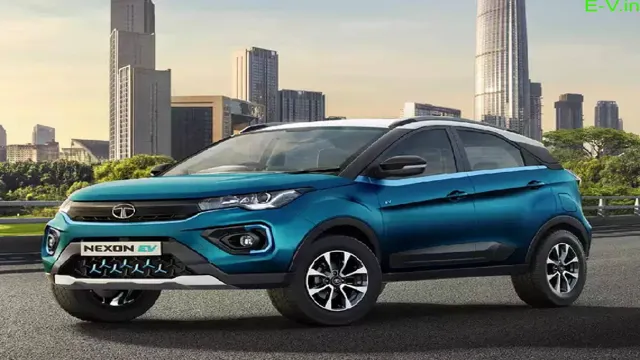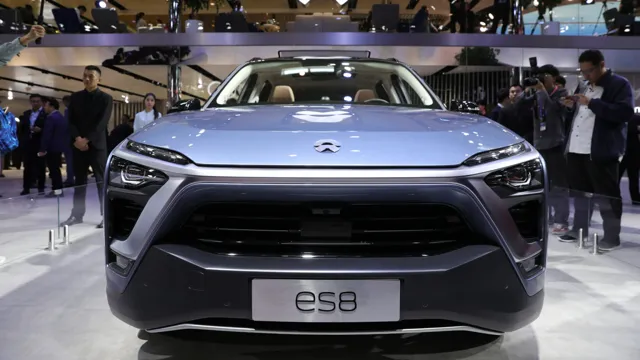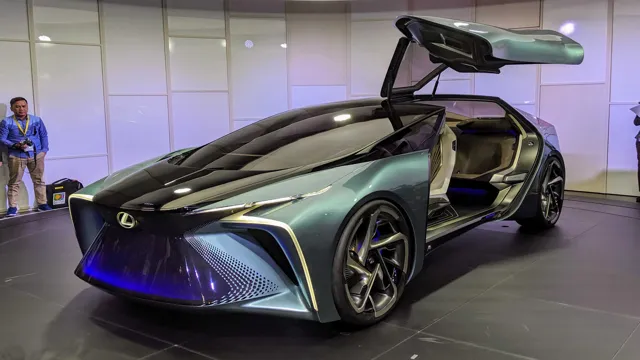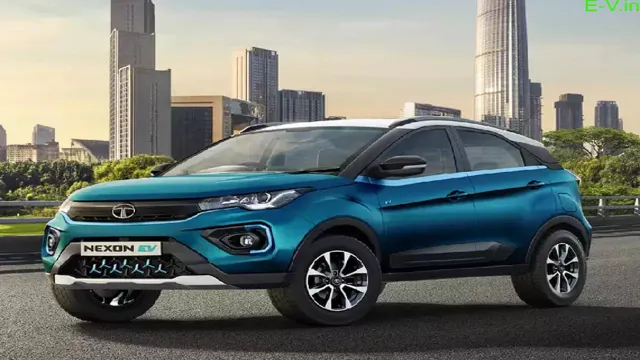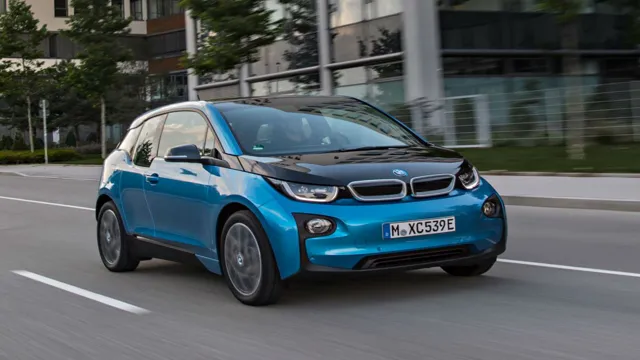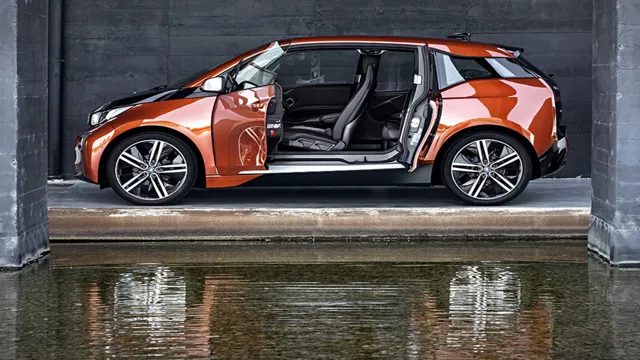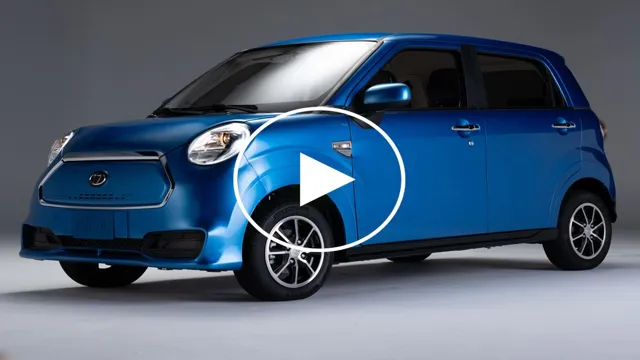Revving Up: Exciting Updates and Developments in Electric Cars in India!
Electric cars have been a hot topic in recent years, especially in India as the government’s push towards electric mobility has been gaining momentum. There’s always something new happening in the automobile industry, and the latest developments in India’s electric car scene are shaping up for an exciting future. In recent news, India’s largest car manufacturer, Maruti Suzuki, has announced its plans to introduce electric cars in the Indian market.
The company is working on developing a new electric car platform that will be exclusively designed for India and exported to international markets. This move is a significant step in the right direction towards cleaner energy and increased adoption of electric vehicles in India. Another exciting development is the launch of the Mahindra eKUV100, India’s most affordable electric car.
The vehicle is packed with features like fast charging and can cover a range of up to 147 kilometers on a full charge. The Indian government is also pushing towards a greener future with its FAME-II scheme, which offers incentives to manufacturers to produce electric vehicles. This scheme has led to major players like Tata Motors and Hyundai launching their electric vehicles in the Indian market.
In conclusion, the future of electric cars in India looks promising, and the latest developments in the industry are only the beginning. With more manufacturers exploring the electric car market, there is a high chance that the Indian market will see a massive transformation in the coming years. The benefits of adopting electric vehicles include lower carbon emissions, reduced air pollution, and a more sustainable and renewable energy source for the future.
Government Initiatives
Electric cars have been gaining traction in the Indian market in recent years, and there have been several government initiatives to promote the adoption of electric vehicles. One of the most prominent initiatives is the FAME (Faster Adoption and Manufacturing of Electric Vehicles) scheme, which was established in 2015 and has since been extended multiple times. Under this scheme, the government provides financial incentives to manufacturers and buyers of electric cars, making them more affordable and accessible.
Additionally, the government has set a target to have only electric vehicles on the roads by 2030 and has been working on developing the necessary infrastructure, such as charging stations, to support this transition. Despite some challenges, such as the high cost of batteries and limited range of some models, the future of electric cars in India looks promising, with more and more people recognizing the need to reduce carbon emissions and improve air quality. The latest electric car in India news shows that several manufacturers are planning to launch new models in the coming months, further increasing the options available to Indian consumers.
Electric Vehicle (EV) Policy 2021: Targets and Incentives
The Indian government has set ambitious targets for electric vehicles (EVs) adoption as part of its new EV policy for 202 The policy calls for at least 30% of new vehicle sales to be electric by 2030. To achieve this goal, the government plans to offer incentives such as direct subsidies on EV purchases and tax breaks for manufacturers.
Furthermore, the policy aims to create a robust charging infrastructure across the country. The government has also proposed a new program called ‘scrappage’, where owners of old, polluting vehicles will be encouraged to exchange them for a discount on new EVs. This program is expected to help drive EV adoption while also reducing emissions and boosting the economy.
With these initiatives, the government is committed to creating a sustainable, green transportation system in the country.
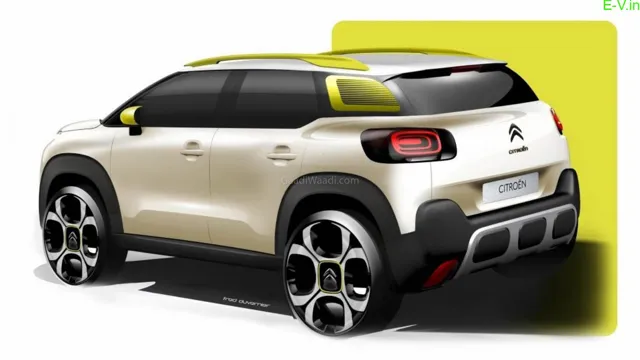
FAME II Scheme: Subsidies for Electric Vehicles
The Indian Government has taken an eco-friendly initiative by introducing the FAME II scheme, which provides subsidies for electric vehicles. This scheme aims to encourage the adoption of electric vehicles in the country and reduce the level of pollution caused by traditional petrol and diesel vehicles. With the FAME II subsidy, buyers of electric vehicles can get financial assistance of up to 50% on the price of the vehicle, making electric vehicles more affordable for the general public.
Moreover, this scheme also focuses on creating an ecosystem for the development of electric vehicles and charging infrastructure. The Indian Government aims to subsidize about 10 lakh electric two-wheelers, five lakh three-wheelers, and 55,000 four-wheelers under this scheme. The FAME II scheme is indeed a fantastic opportunity for citizens to make a positive impact on the environment while also benefitting from financial incentives.
Market Trends
There has been a noticeable surge in the demand for electric cars in India, and the recent push by the government towards clean energy has further bolstered the growth of this sector. As per the latest electric car in India news, several leading global car manufacturers have been actively investing in this market, and many new domestic players have also emerged in recent years. With the rising concerns of pollution and environmental degradation, more and more Indian consumers are turning towards eco-friendly options, and electric cars are slowly but surely gaining popularity.
It is believed that the government’s decision to provide incentives to electric vehicle buyers and levy high taxes on petrol and diesel vehicles will further accelerate the adoption of electric cars in the country. As this trend continues to unfold, it will be exciting to see how the automotive landscape in India transforms in the coming years.
Sales of EVs in India: Statistics and Forecasts
Electric vehicles (EVs) have shown significant growth in India in recent years, with increased support from the government and rising awareness about environmental issues. Market trends show that the sales of EVs in India are expected to reach 2 million units by 2025, making up around 30 percent of the total passenger vehicle sales.
The Indian government has also set an aggressive target of achieving 30 percent electrification of its fleet by 2030. These trends indicate a shift towards more sustainable modes of transportation and the increasing adoption of EVs across the country. With the availability of affordable EV models and the establishment of a charging infrastructure, the future of electric mobility in India looks promising.
The automotive industry in India is making strides towards achieving this target, and it is exciting to see how the market trends will shape the future of EVs in India.
Top Electric Cars Available in India: Features and Prices
Market Trends The electric vehicle market in India has seen tremendous growth in recent years, with more and more automakers launching electric cars to meet the growing demand for eco-friendly vehicles. One of the significant market trends is the rising popularity of electric cars among consumers due to their many benefits, including lower maintenance costs, reduced emissions, and the ability to save money on fuel expenses. Additionally, the government’s push towards electric mobility in India has further fueled the growth of the electric car market.
As a result, many top automobile brands have introduced electric vehicles across different segments, ranging from economic hatchbacks to luxury SUVs. Some of the popular electric cars available in India include the Tata Nexon EV, Mahindra eKUV 100, Hyundai Kona Electric, MG ZS EV, and the Mercedes-Benz EQC. With the increasing demand for electric cars, we can expect the market trend to grow significantly in the coming years.
Challenges to EV Adoption: Infrastructure and Cost
When it comes to electric vehicle adoption, there are a few challenges that continue to slow down progress. Infrastructure and cost are two of the biggest hurdles holding EVs back from mass adoption. Firstly, the lack of charging infrastructure poses a significant problem for drivers who need to recharge their vehicles while on the go.
Many cities and towns still don’t have convenient charging stations located in public areas, making it difficult for drivers to find a charging station. This is particularly problematic for those who live in apartments or condos, where it isn’t always possible to install a charging station at home. Additionally, the cost of EVs often outweighs the benefits, deterring many people from investing in a new electric car.
While prices have come down over the years, EVs are still more expensive than their gas-powered counterparts. As battery technology continues to advance and more charging infrastructure is built, we should see a shift towards mass electric vehicle adoption.
Automakers’ Plans
Electric cars in India have become a hot topic among automakers in recent years. With growing demand for eco-friendly vehicles, car manufacturers are competing to introduce electric models that cater to the Indian market. In 2021, Mahindra announced its plans to launch the eKUV100 with a starting price of under Rs 9 lakh.
Similarly, Tata Motors has introduced the Nexon EV and is working on bringing the Altroz EV to India. At the same time, MG Motor India is set to launch the electric version of its ZS SUV in the country. Additionally, there are reports of Maruti Suzuki partnering with Toyota to launch an electric car in India.
Collectively, these automakers are making huge investments and driving forward the adoption of electric vehicles in India. As the government provides subsidies and incentives for electric cars, we are likely to see more brands entering the market and offering electric vehicles that are affordable and meet the needs of consumers. The demand for electric cars in India is continuously increasing, and it is an exciting time to witness the evolution of the automotive industry in the country.
Tata Motors, Mahindra, and Others: Strategy for EVs in India
In recent years, Indian automakers such as Tata Motors and Mahindra have been focusing on developing and promoting electric vehicles (EVs) in the country. Tata Motors, for instance, has been introducing electric versions of its existing models like Tiago and Tigor, while also working on new EV platforms and battery solutions. Mahindra, on the other hand, has launched an all-electric compact SUV called eKUV100 and plans to launch several more EVs in the coming years.
Apart from these companies, several other automakers like Hyundai, MG Motor, and Maruti Suzuki are also investing heavily in EVs. The strategy behind this push towards EVs is driven by factors such as government incentives and regulations, rising environmental concerns, and the increasing affordability and availability of EVs. These companies aim to capture a significant share of the rapidly growing EV market in India, which is expected to reach 10% of the total vehicle sales by 202
With more and more customers opting for eco-friendly mobility solutions, it is a critical time for automakers in India to carve out a niche in the EV market.
Global Automakers Eyeing Indian EV Market: Investments and Launches
Electric vehicles (EVs) are becoming increasingly popular in India, and global automakers are taking note. Companies such as Tesla, Hyundai, and Nissan have already announced plans to invest in the Indian EV market. Tesla has plans to set up an electric car manufacturing unit in Karnataka, while Hyundai and Kia have invested in a new production facility in Tamil Nadu.
Nissan, meanwhile, is planning to launch its Leaf electric car in India soon. Other brands, including Mercedes-Benz and Audi, have also announced plans to launch electric vehicles in India in the near future. With the Indian government’s push to electrify the transport sector, the demand for EVs is expected to rise significantly in the coming years.
As such, automakers are not only looking to launch new models but also invest in research and development for the Indian market. Overall, the future of electric mobility in India looks bright, and automakers are eager to capitalize on the country’s growing demand for cleaner, more sustainable transport solutions.
Future of Electric Mobility in India
Electric cars in India are on the rise, with several new models hitting the market in the past year. The government of India is also promoting the use of electric vehicles, providing subsidies to both consumers and manufacturers of electric cars. However, the adoption of electric cars in India faces challenges such as high battery costs, lack of charging infrastructure, and range anxiety among consumers.
Nevertheless, several companies such as Mahindra Electric, Tata Motors, and MG Motor have already launched successful electric car models in India. Moreover, some of the major car makers like Hyundai and Nissan have also announced their plans to launch electric vehicles in India soon. With more and more players entering the market, it’s only a matter of time before electric cars become a common sight on Indian roads.
As electric cars in India continue to gain traction, it is expected that there will be a significant increase in demand for these vehicles, which will result in further advancements in the technology and infrastructure required for their widespread adoption. Overall, the future of electric mobility in India looks promising, and it’s a matter of time before we see a significant shift towards cleaner and more sustainable modes of transport.
Conclusion
In conclusion, the news of electric cars in India is like a bolt of lightning striking the automotive industry. The shift towards sustainable transportation has been a long time coming, and with the government’s push towards electric vehicles, it’s clear that the future is electric. While some may still argue about the practicality and affordability of electric cars in India, one thing is certain – the shift towards green mobility is an idea whose time has finally come.
As batteries continue to improve and charging infrastructure becomes more widespread, we can expect to see more and more electric cars lighting up the Indian roads. So let’s charge ahead and embrace the clean and efficient future of mobility!”
FAQs
What is the current status of electric cars in India?
The Indian government has launched several schemes and incentives to promote electric vehicles (EVs) in the country, with the aim to achieve 30% EV penetration by 2030.
What are the top electric cars available in India?
The most popular EVs in India are the Tata Nexon, MG ZS EV, Hyundai Kona, and the recently launched Audi e-tron SUV.
How does the government plan to develop the charging infrastructure for electric cars in India?
The Indian government has set a target of establishing at least one charging station every 3 km in cities and on highways, and various state governments are partnering with private companies to set up charging infrastructure.
Are there any financial incentives for buying an electric car in India?
Yes, the central government offers a subsidy of up to Rs. 1.5 lakh for electric cars priced below Rs. 15 lakh, while some state governments also offer additional incentives such as exemption from road tax and registration fees.

